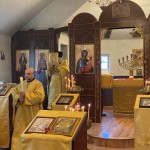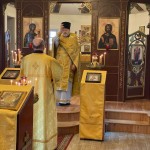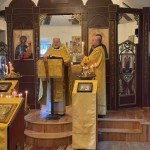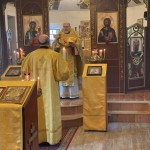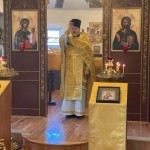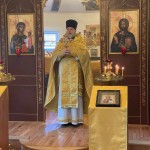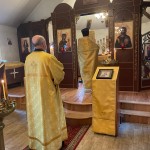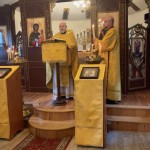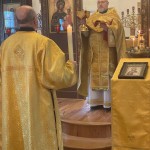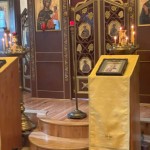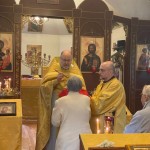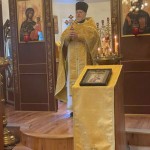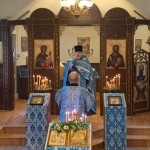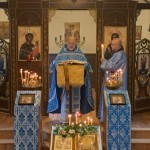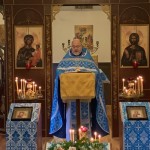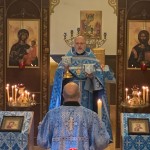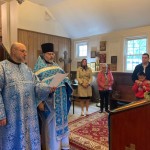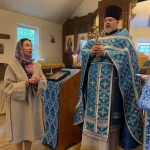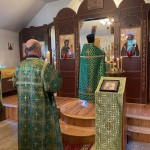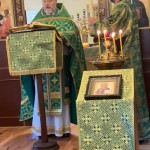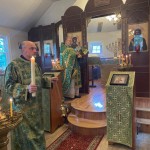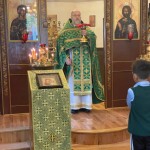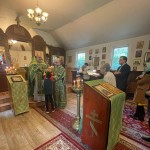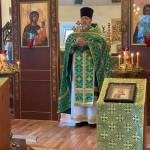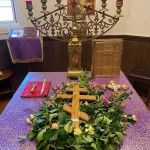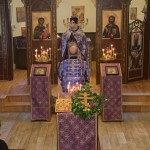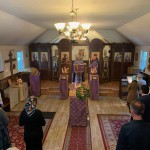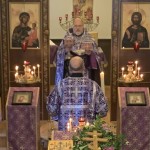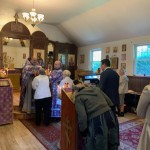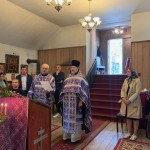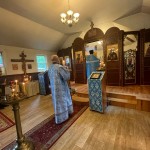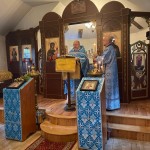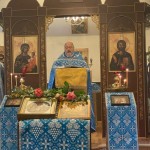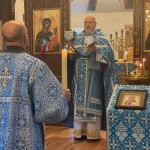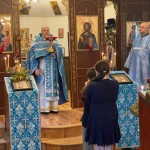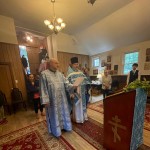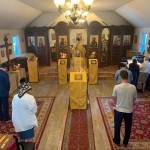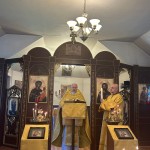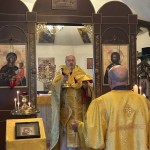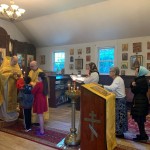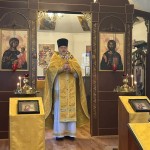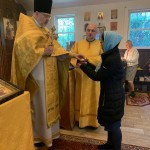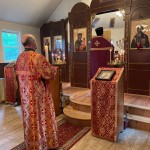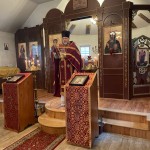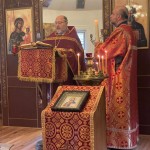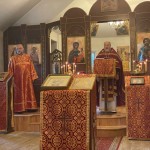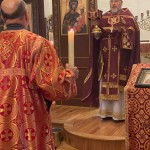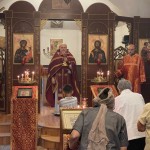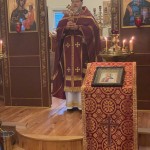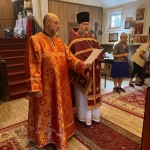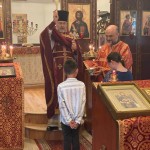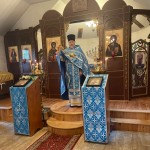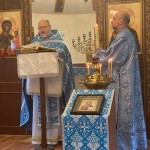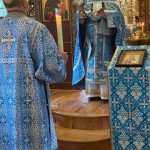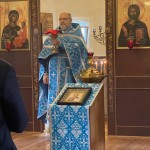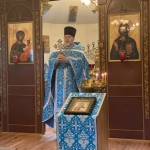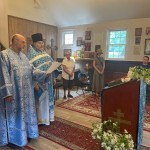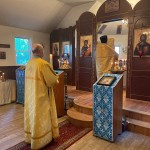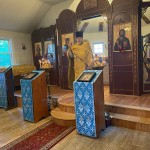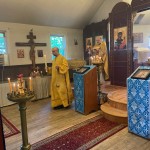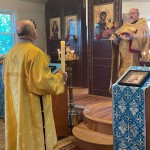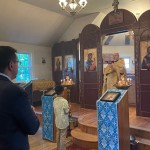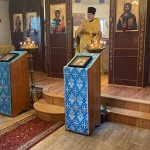On November 5, on the 22nd Sunday after Pentecost, feast of the Holy Apostle James, brother of the Lord, Rector of St. George Church, Archpriest Igor Tarasov served the Divine Liturgy in our parish temple. After the readings from the Sacred Scripture he preached the following homily:
“Dear brothers and sisters in Christ! On the 22nd Sunday after Pentecost we hear about Old Testament rules being abandoned by the followers of the New Testament. In today’s Epistle lesson St. Paul says, “In Christ Jesus neither circumcision nor uncircumcision avails anything, but a new creation” (Gal. 6, 15). It does not matter whether we follow the Old Testament rules. What matters is whether we are the new creation, new people in Jesus Christ”.
“Today we commemorate Holy Apostle James, brother of the Lord. He was not one of the 12 Disciples of Christ but he belonged to the other 70 Apostles. St. James is called the brother of Jesus because he was the son of St. Joseph, thus he was Jesus’ stepbrother. Some time after the Ascension into the heaven Christ appeared to His stepbrother and blessed him to be the first bishop of Jerusalem. St. James was ruling the Jerusalem Church for 30 years. He was presiding at the first apostolic gathering, the Council of Jerusalem, that was deciding on the question whether the Gentiles converting to Christian faith must keep the Old Testament rules. The Apostles decided that they should not. And St. James gave a speech about that (Acts 15, 13-21). So, today’s celebrated Saint has a direct relation to the theme of today’s Sunday Epistle reading: in our Christian faith, it does not matter whether we follow the Old Testament. What matters is that we ought to be the new people in Christ”.
“Thinking of our own life experiences we see that many of us wish to correct our past mistakes. We often wish to change our wrong choices we made in our lives. We would be happy to get a “fresh start”, to have a new beginning, “to start from scratch.” “If only I could begin all over again!” This has been our plea since Adam. Jesus, the Son of God came to us to answer to this plea. He came to give each one of us a fresh start. And He does not require any more to bear a sign of our allegiance to Him on our flesh, as He required the people of the Old Testament. They circumcised their baby boys to show their covenant with God. In Christ this is no longer required. But there are other more important conditions to meet, in order to become that new creation St. Paul speaks of in today’s Epistle”.
“First of all, we have to be born in Christ. Jesus says, “Most assuredly, I say to you, unless one is born again, he cannot see the kingdom of God… unless one is born of water and the Spirit, he cannot enter the kingdom of God” (Jn. 3, 3-5). This new birth is given to us in Baptism. The line of heredity was transferred from the old Adam line to the new Christ line. Life found a new origin, a new beginning. We received the Holy Spirit. Our bodies became temples of God. The blood of Jesus now flows in us through Holy Communion. We became the new creation”.
“But this new birth in Christ must be followed by a personal acceptance of Christ as our Lord and Savior. Many of us were baptized at the early age. But even those who received that Sacrament later in their lives, may lose some freshness of its grace. Thus, after the new birth should come this personal acceptance, personal commitment to Him as God. This is followed by repentance for our sins and a complete forsaking of the old life. It is called conversion. But even repentance itself is called the “second Baptism”. We are born again and again in a true repentance, in a sincere and honest confession”.
“A man when he is born is only a man. But a man when he is reborn in Christ is more. He is a new man with a new life and a new name. He is even named after Christ: “Christian””.
“Holy Apostle James, brother of the Lord, being born as a Jewish man, being circumcised, was reborn in Christ. He ruled the mother of all the Churches, the Church of Jerusalem. Finally, he was martyred there for Christ, being thrown down from the roof of the Holy Temple. His persecutors were driven by the same unwise zeal of the followers of the Old Testament, as the persecutors of Christ. St. James was not only a man born in the earthly household of Jesus Christ. He became more than that, a new man in Christ, a righteous man filled with the Holy Spirit and being a member of the heavenly household of Christ”.
“Therefore, dear brothers and sisters, let us truly “commend ourselves and each other, and our all life unto Christ, our God,” as we pray every Divine Liturgy. Let us receive a new spiritual birth a renewal in the holy Mystery of Penance, to refresh our baptismal grace and ability to be the new people in Christ. Let us participate in the spiritual life of the Christian community, of the Church. Let us be together in this Ark of salvation, a saving Sheepfold. Then we will be able to become this new people of God, a new creation which will be worthy of seeing the Kingdom of God and entering into eternal blessedness!”
During preparation for Holy Communion the choir nicely performed the Psalm 33.
After the dismissal of the Liturgy Fr. Igor made the announcements, especially regarding the collection for our building and ground maintenance which will be taken next Sunday.

